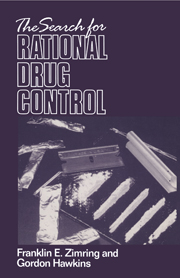Book contents
- Frontmatter
- Contents
- List of tables and figures
- Preface
- Acknowledgments
- Part One The drug problem
- Part Two The drug control policy process
- Introduction
- 5 The universal proposition: Children and drug control policy
- 6 Drug control policy and street crime
- 7 The federal role in a national drug strategy
- 8 Memorandum to a new drug czar
- Appendix: Estimates of illicit drug use - a survey of methods
- References
- Index
8 - Memorandum to a new drug czar
Published online by Cambridge University Press: 08 January 2010
- Frontmatter
- Contents
- List of tables and figures
- Preface
- Acknowledgments
- Part One The drug problem
- Part Two The drug control policy process
- Introduction
- 5 The universal proposition: Children and drug control policy
- 6 Drug control policy and street crime
- 7 The federal role in a national drug strategy
- 8 Memorandum to a new drug czar
- Appendix: Estimates of illicit drug use - a survey of methods
- References
- Index
Summary
Dear Sir or Madam:
First, our congratulations and best wishes on your appointment. Yours is a difficult and challenging job in the 1990s, and this memorandum is intended to help.
The Office of National Drug Control Policy was sired by the enormous importance of drugs as a national issue and congressional discontent with how the federal government's role in the drug war had been administered. In the 1988 legislation, the new federal drug control office was charged with producing no less than a national strategy to combat drug abuse, and one inevitable concomitant of such a national strategy was the increased focus on the federal government's responsibility for drug control policy and its outcomes. The first “drug czar” had as his principal responsibility the creation of a comprehensive drug control strategy (see Office of National Drug Control Policy, 1989). Each succeeding occupant of this office must necessarily evaluate the impact of the policies of his or her predecessors and propose policy changes. The first drug czar faced an empty canvas and correspondingly painted it with broad strokes. Large policies were announced and supported without assessment or evaluation.
The task of succeeding generations of leadership in the federal drug war will be less romantic but of substantial practical importance. Our advice to you is offered in two layers. First, we shall identify two major deficiencies in the National Drug Control Strategy of the Bennett administration.
- Type
- Chapter
- Information
- The Search for Rational Drug Control , pp. 177 - 192Publisher: Cambridge University PressPrint publication year: 1992



